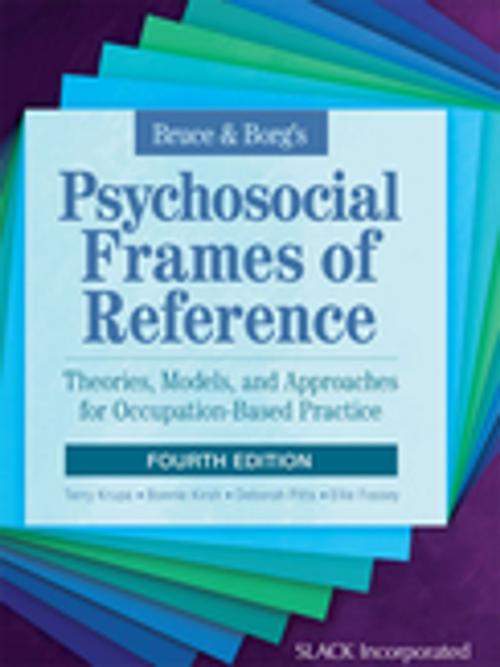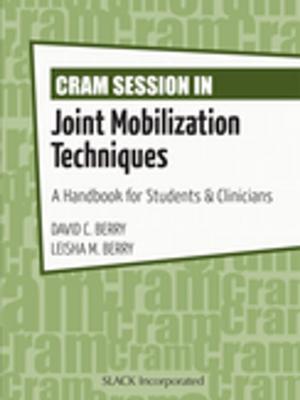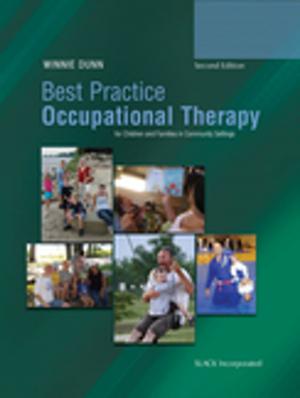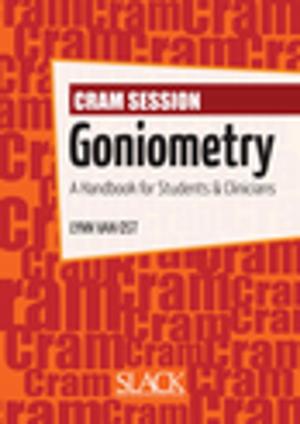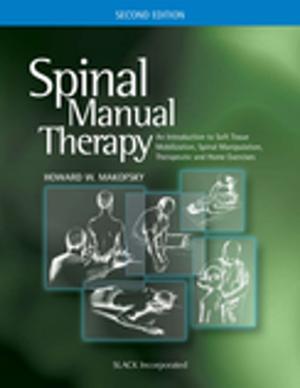Bruce & Borg's Psychosocial Frames of Reference
Theories, Models, and Approaches for Occupation-Based Practice, Fourth Edition
Nonfiction, Health & Well Being, Medical, Allied Health Services, Occupational Therapy| Author: | ISBN: | 9781630913137 | |
| Publisher: | SLACK Incorporated | Publication: | December 15, 2015 |
| Imprint: | SLACK Incorporated | Language: | English |
| Author: | |
| ISBN: | 9781630913137 |
| Publisher: | SLACK Incorporated |
| Publication: | December 15, 2015 |
| Imprint: | SLACK Incorporated |
| Language: | English |
Psychosocial health is a fundamental element of all human health and well-being. Psychological, emotional, and social factors interact to influence peoples’ occupational lives, in turn influencing psychosocial health. Occupational therapists practicing in contemporary health and social sectors require the knowledge, attitudes and skills to identify and address these psychosocial factors. The classic and renowned, Bruce & Borg’s Psychosocial Frames of Reference: Theories, Models, and Approaches for Occupation-Based Practice, Fourth Edition by Drs. Terry Krupa, Bonnie Kirsh, and their contributors, examines psychosocial models of practice and their application across a wide range of practice areas in occupational therapy, instead of being singularly focused on practice areas of the needs of people living with identified mental illnesses. Efforts have been made to highlight the relevance of specific models to practice for people with mental illnesses, particularly where the issues experienced by this group have historically been poorly addressed. The authors have also organized models and practice approaches according to the level at which they intervene to create change – occupation, person, environment, and transdisciplinary levels. As their central domain of concern, the first group of occupational models or approaches have a focus on “what people do” in their daily lives. A second group of models reflect those that intervene at the level of the person. This group understands strengths and problems in occupation as evolving largely from features or qualities of the individual, and the therapeutic processes suggested are directed to changing or building upon these features. A third group of models and approaches focus on the psychosocial context and environment to elicit and enable a positive change in occupation. In some cases, these environmental models expand commonly-held, narrow definitions of “clinical” practice to encourage occupational therapists to engage in population-level practices. Finally, a small group of models of practice are labeled as transdisciplinary. Transdisciplinary models provide ways to develop conceptualizations of psychosocial practice issues, practice language, and approaches that are shared across disciplinary boundaries. New in the completely updated Fourth Edition: • Contains models and practice approaches that are useful in enabling occupational therapists to address psychosocial concerns relevant to human occupation • Explores the psychological, emotional, and social experiences of humans carried out in context and their linkages to occupational engagement and well-being • Puts forward practice models that focus on person-level aspects of occupation in psychosocial practice • Examines transdisciplinary models and their relationship to psychosocial occupational therapy concepts and practices • Presents well established models and frameworks that focus on population and contextual level factors relevant to psychosocial occupational therapy practice Instructors in educational settings can visit www.efacultylounge.com for additional materials to be used in the classroom. With its updated models and a wide range of practice areas, Bruce & Borg’s Psychosocial Frames of Reference: Theories, Models, and Approaches for Occupation-Based Practice, Fourth Edition is the perfect resource for the occupational therapist student, faculty, and clinician or any practitioner in psychosocial and mental health.
Psychosocial health is a fundamental element of all human health and well-being. Psychological, emotional, and social factors interact to influence peoples’ occupational lives, in turn influencing psychosocial health. Occupational therapists practicing in contemporary health and social sectors require the knowledge, attitudes and skills to identify and address these psychosocial factors. The classic and renowned, Bruce & Borg’s Psychosocial Frames of Reference: Theories, Models, and Approaches for Occupation-Based Practice, Fourth Edition by Drs. Terry Krupa, Bonnie Kirsh, and their contributors, examines psychosocial models of practice and their application across a wide range of practice areas in occupational therapy, instead of being singularly focused on practice areas of the needs of people living with identified mental illnesses. Efforts have been made to highlight the relevance of specific models to practice for people with mental illnesses, particularly where the issues experienced by this group have historically been poorly addressed. The authors have also organized models and practice approaches according to the level at which they intervene to create change – occupation, person, environment, and transdisciplinary levels. As their central domain of concern, the first group of occupational models or approaches have a focus on “what people do” in their daily lives. A second group of models reflect those that intervene at the level of the person. This group understands strengths and problems in occupation as evolving largely from features or qualities of the individual, and the therapeutic processes suggested are directed to changing or building upon these features. A third group of models and approaches focus on the psychosocial context and environment to elicit and enable a positive change in occupation. In some cases, these environmental models expand commonly-held, narrow definitions of “clinical” practice to encourage occupational therapists to engage in population-level practices. Finally, a small group of models of practice are labeled as transdisciplinary. Transdisciplinary models provide ways to develop conceptualizations of psychosocial practice issues, practice language, and approaches that are shared across disciplinary boundaries. New in the completely updated Fourth Edition: • Contains models and practice approaches that are useful in enabling occupational therapists to address psychosocial concerns relevant to human occupation • Explores the psychological, emotional, and social experiences of humans carried out in context and their linkages to occupational engagement and well-being • Puts forward practice models that focus on person-level aspects of occupation in psychosocial practice • Examines transdisciplinary models and their relationship to psychosocial occupational therapy concepts and practices • Presents well established models and frameworks that focus on population and contextual level factors relevant to psychosocial occupational therapy practice Instructors in educational settings can visit www.efacultylounge.com for additional materials to be used in the classroom. With its updated models and a wide range of practice areas, Bruce & Borg’s Psychosocial Frames of Reference: Theories, Models, and Approaches for Occupation-Based Practice, Fourth Edition is the perfect resource for the occupational therapist student, faculty, and clinician or any practitioner in psychosocial and mental health.
